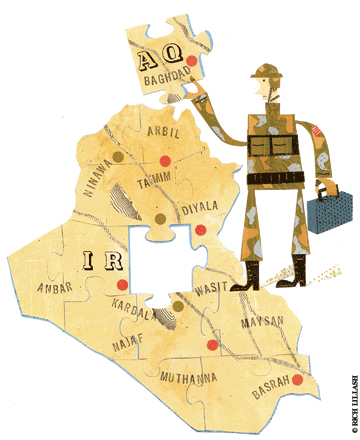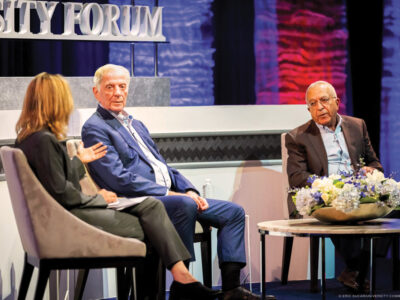
Class of ’72 | When we spoke with John Jones WG’72 this past January, he was back home in suburban Washington for a week, catching up with family and friends. Oh—and taking care of a little business, too.
“We had a conference with the president, the vice president, the secretary of state, chairman of the joint chiefs of staff, Ambassador Crocker, and three other leaders of PRTs [Provincial Reconstruction Teams] from Baghdad,” recalled Jones. “It was a very good meeting. The president was very interested in what was going on on the ground. I’m not sure if it was a case where he had predicted what was going to happen, but certainly he didn’t seem overly surprised.”
The PRTs represent a joint effort between the State Department and the Defense Department to help rebuild Iraq, province by province. Jones, a foreign-service officer with 27 years of service, has been leading the PRT in Diyala Province since February 2007. He is in charge of 38 civilian personnel, and his team works with a civil-affairs company from the Fourth Brigade of the Second Infantry Division.
Having seen the PRTs at work in Afghanistan, “I thought they were the answer to a lot of the problems that were developing in Iraq,” Jones explained. “I felt that I had enough experience and background for the work.”
And so, at an age when most men are thinking about a comfortable retirement, the 63-year-old Jones—a National War College graduate who spent six years in the U.S. Army Reserves before joining the State Department—put himself back on the line.
Diyala, located north-northwest of Baghdad, is a “hotbed of insurgent activity,” with a “major establishment of al-Qaida fighters,” he pointed out. It’s home to some 1.6 million people: 65 to 70 percent of whom are Sunni, 20 percent Shia, 10 to 12 percent Kurd, and the rest a mix of Turkmen and other groups. The governor is a Shiite, and has survived eight assassination attempts. Security is tenuous and most of the local infrastructure is fragile, crumbling, or non-existent.
As a result, leading the PRT puts his MBA training to the “ultimate test,” Jones said. “The skills you develop in the MBA program—dealing with management and personnel, accounting, the accountability of large sums of money—those are the kinds of things that I do every day.”
His decades of experience as a foreign-service officer come in handy, too. The central government in Baghdad is run by Shia, and the needs of the predominantly Sunni province—which range from food and fuel distribution “all the way down to sending money up for the bank”—are often “ignored or overlooked,” Jones explained. If the money doesn’t get sent, then “you can’t pay the policemen, you can’t pay municipal salaries, you can’t pay retirees—and these folks are going to turn to some other source for their income.” And some of those other sources are openly hostile to Americans.
“I didn’t expect the amount of violence that has taken place up in the province,” Jones admitted. “It’s a frightening thing to be shot at and mortared and so forth.
“But it also gives meaning to the reasons why we are there,” he added quickly. “We’re dedicating ourselves to getting the infrastructure back into place.”
There have been some inspiring success stories and “a number of very notable characters,” he said. One is a Shiite member of the Provincial Council whom Jones describes as a “very strong lady.” Several members of her family were assassinated, and the Provincial Council had not been able to achieve a quorum for several months. “She spent the night at the government center by herself, sleeping on the floor with two guns,” Jones recalled. “And she was there the next day to make sure they had a quorum.”
Similarly, despite those eight assassination attempts over the last two years, the Shiite governor “still comes to work every day. He’s tired and he’s frustrated oftentimes. But he’s there. And he’s taken a real leadership role in the province.”
Jones spoke glowingly of the soldiers he works with and who protect him and his fellow civilians.
“America’s in good hands when these kids take over,” he said. “But it’s also really sad when these kids come back [to the U.S.] and need to get help—not just for their physical needs, but counseling. They’ve put their lives on the line. I hope our government does what’s needed to help them.”
Asked how he sees the situation in Iraq, he responded: “I’m more optimistic, to be honest. If you make comparisons to the way it was when we first got here, there’s been a huge change. At first you could drive into Baquba [the capital] and you wouldn’t see a soul on the street. Now there are traffic jams. The schools are open, and kids are playing soccer. If we can maintain security in the province, I think people want nothing more than to be able to return to their lifestyle. And I think they see a little hope.”
—S.H.




